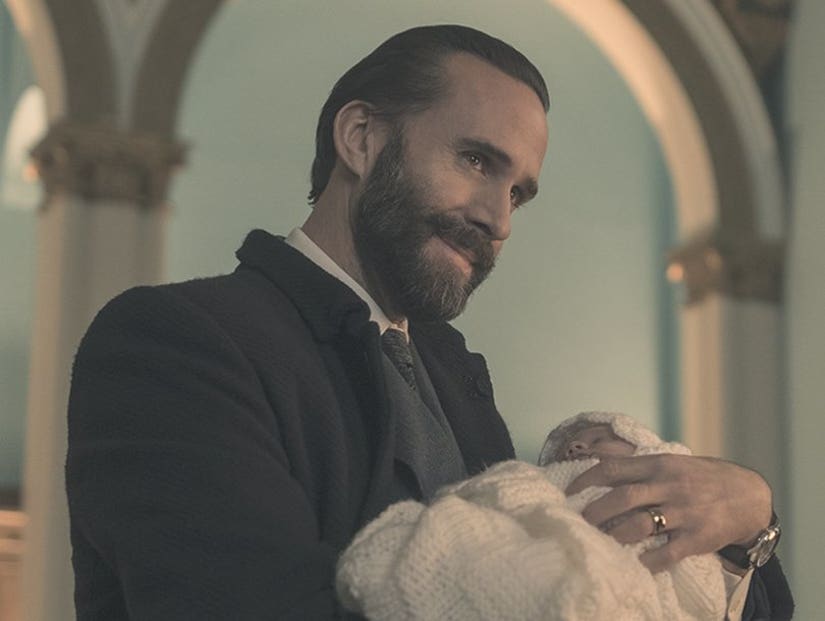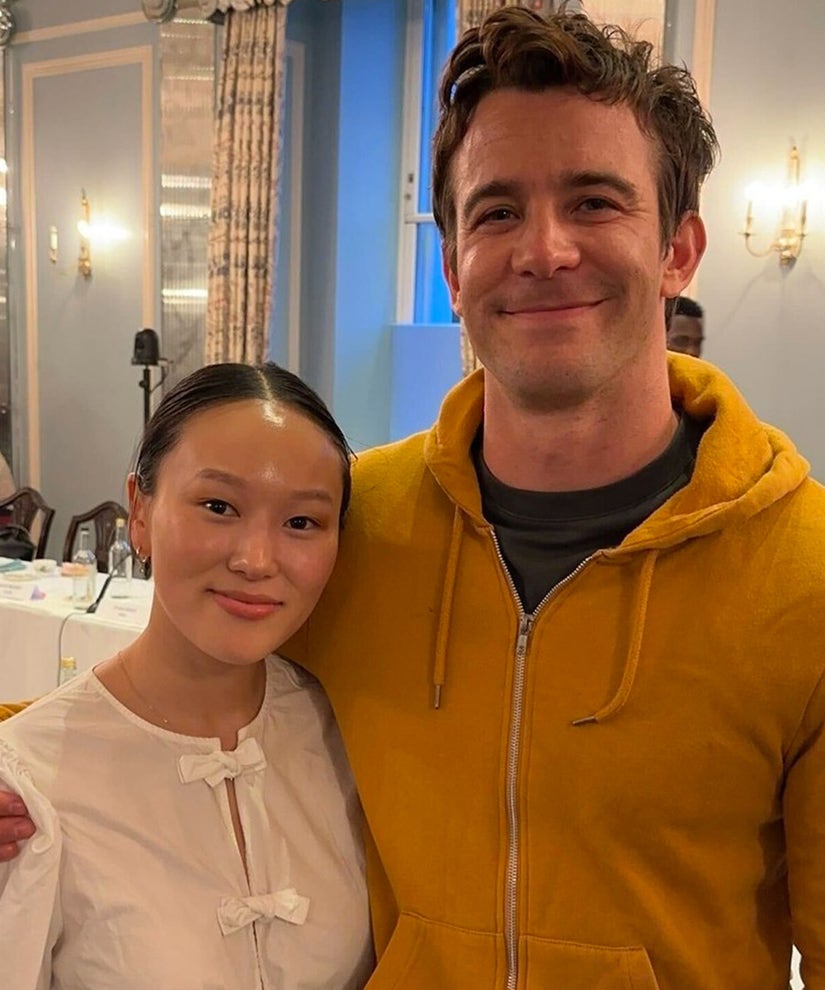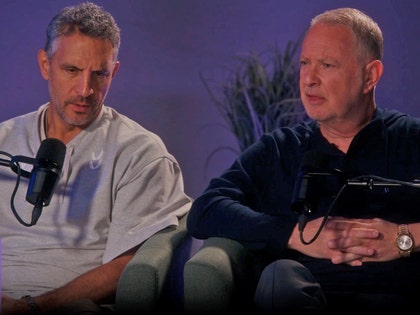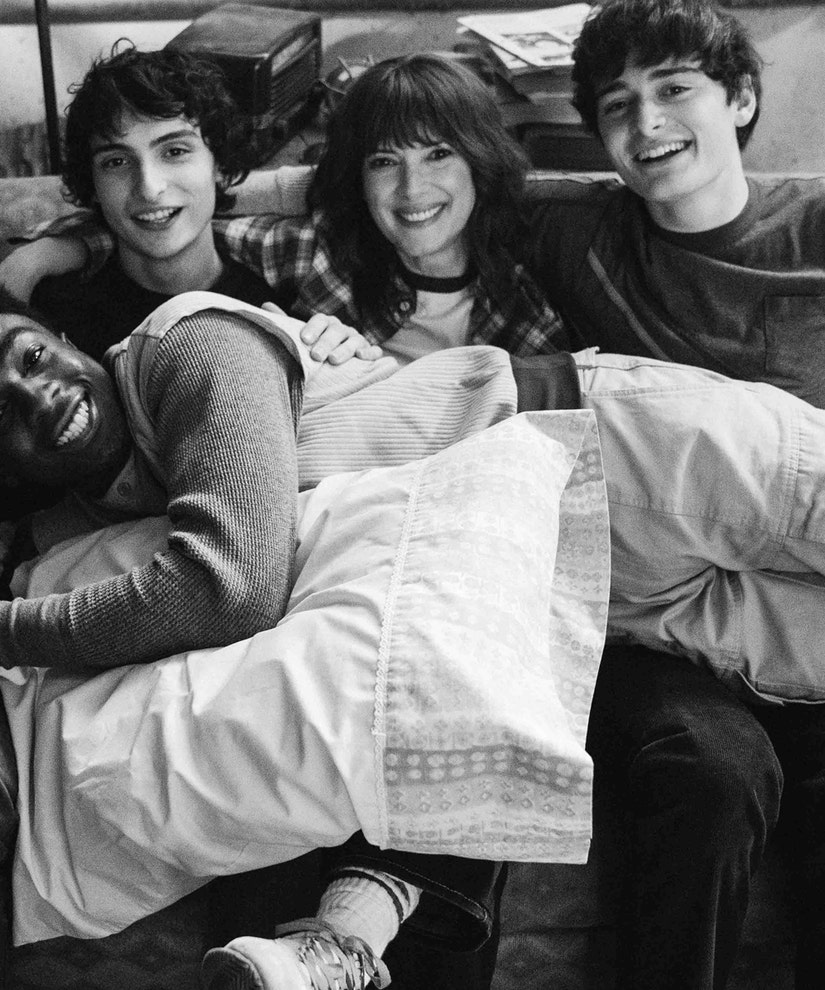"All you need is love," The Beatles sang on records that are banned in the former United States of America on "The Handmaid's Tale." No popular entertainment of any kind is allowed, because those can spread ideas and ideas are the enemy of the state.
It was a quiet hour of "The Handmaid's Tale," and a depressing one for June's (Elisabeth Moss) return yet again to the Waterford home, but also one that shines a spotlight on what happens when totalitarian regimes show off their cruelty. What they perceive as a display of power that will cow their nation actually serves to foster discontent and revolutionary thoughts.
 Hulu
Hulu
'The Handmaid's Tale': Surprise Cameo by Oprah Winfrey Brings New Hope and Life, Just Not Enough
View StoryIt can also unite the oppressed peoples together to face a common enemy. In Gilead, that enemy is the men in power, and even their wives are turning against them. Serena (Yvonne Strahovski) has been the ultimate symbol of the complacent and compliant wife, even though her reasons for helping to create Gilead were totally self-serving: so she could steal a baby legally.
Nevertheless, we have seen how much she struggles under the restrictive regime that doesn't allow her to pursue any of her passions, or even read. She's even shown kindness and commiserated with June and the other Handmaids a little about the hellhole she put them in. But then, she always lashes out and takes out all of that frustration on those of even lower standing than her, which usually means June.
CLEANSED OF SIN
Now that she's achieved her dreams of motherhood, Serena's mind has begun to clear and she can again start to see this world she has created. It is a world of structure and rules and control at all costs. The ceremony at the public pool was just about the most disgusting and abhorrent thing we've seen yet -- and we've seen some things! -- so it was refreshing to see Serena absolutely torn apart by grief.
She'd have to be an absolutely inhuman monster to have felt nothing watching Gilead's version of Romeo and Juliet sacrifice everything for love. Eden (Sydney Sweeney) and the Guardian Isaac (Rohan Mead) had found love but Gilead is not a society built on love, and so theirs was a forbidden union. What's remarkable about their conviction was that they both totally drank the Kool-Aid of Gilead.
Eden was more pious than anyone we've met yet. As with many in power, religion is used more as a tool for control and subjugation than a model to live by. Fred Wateford (Joseph Fiennes) and the other Commanders are about as pious as Lucifer himself. Eden's death was proof that there is no room for piety in this society built on a bastardization of Christian doctrine.
 Hulu
Hulu
8 Cracks That Will Surely Destroy 'The Handmaid's Tale' Patriarchy
View StoryIt's a cautionary message for any who would take their holy words and twist them to serve their own personal needs. That's not how faith works. God doesn't work for you, it's the other way around. Too many people start with what they want and then justify it by picking and choosing from their holy doctrines.
That's exclusionary and goes against almost every faith on the planet. Eden and Isaac were in love. They were sentenced to death, unless they confessed their sins. Now that confession wouldn't be true in the eyes of their God, nor would it be for their God. It would be for the selfish, greedy men in power, a way of swearing fealty to their show of strength.
This is an extreme situation, sure, but it's worth paying attention to because it may not be as far-fetched as you think. Many now hide their hatred and bigotry and small-mindedness behind their bastardization of doctrine. And some have begun to organize with like-minded individuals. Faith-based hate is just a small step from faith-based murder. Just ask the Crusades.
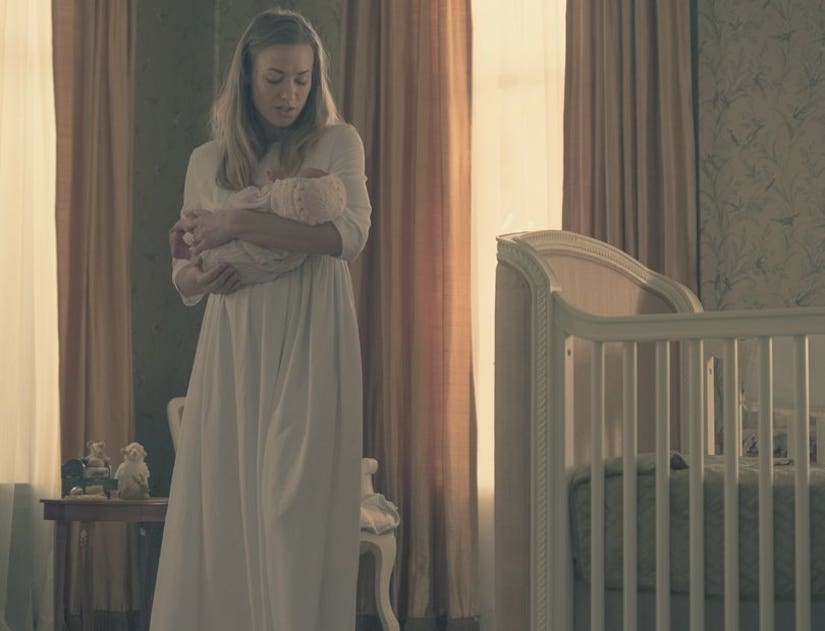 Hulu
Hulu
SERENA'S SECOND CHANCE
Now, let's back up a second and say that we are by no means condoning, approving of, or even liking Serena Waterford again, even if she did show some humanity here. She is totally a monster, and humanizing a monster doesn't make her less of a monster. They've got a long way to go if the writers want to actually win fans over to her side.
But we don't have to like her to appreciate her value to the show as representative of the rancor bubbling within the shiny Gilead surface the men are carefully trying to maintain. There is a lot of ugliness in Gilead, and the world finally began to see it after Nick (Max Minghella) got those Handmaid letters out during that trip to Canada.
Serena played the dutiful wife then, standing by Fred's side as he smiled that awful smile with the cold, dead eyes. We've seen time and again how much this world she is now trapped in pains her, while Fred smiles and enjoys all of the fruits of her labors.
She made it clear that her drives are purely selfish. She was willing to sell out an entire nation for a single baby of her own. She didn't care what happened to that baby's mother, even wanting to ship June away immediately, and she didn't care how many people had to suffer or die so long as she got her baby.
Clearly appealing to her humanity isn't going to work. Instead, keep it simple and narrowly focused on Serena's world. It's the only one she really cares about.
 Hulu
Hulu
'The Handmaid's Tale' Demonstrates How to Systematically Break a Person in 8 Easy Steps
View StorySeeing Eden and Isaac murdered for falling in love impacted that world directly. These are people she's chatted with, and in the case of Eden, even took on a motherly role toward. Serena was devastated by the abject cruelty of Fred and the other men as these two young people drowned.
Again, we have to reiterate that this is a nation supposedly founded on the need to increase fertility and have babies. Killing of young women who may be fertile is counter-productive at best. But again, that's just the doctrine they're selling. It's not about that at all for Fred and the other men.
But it is about that for Serena. And now that her heart's desire has been met, she might start to look at this larger world that exists outside of her nursery. It was worth noting that she took a big step in doing just that by inviting June to finally nurse her baby in that very room.
The episode opened with Serena and the baby alone in that room, and everything was bliss. But it was also a fantasy. Babies aren't all smiles and joy. They're hard work, and separating June from the baby was impacting milk production. Once again, Serena's selfishness and pride were the factors. It was her baby and she wanted it all alone.
By the close of the hour, Serena was sitting by as June nursed her baby in that same chair. This is the reality. She can't do it alone. She can't separate herself from the world just because she got her baby. She still has to live in that world. June nursing is the first step. Hopefully, she'll keep opening her eyes, even though it's the harder path to take.
 Hulu
Hulu
WHAT IS STRENGTH?
So what is strength, then? We've been led to believe all along that what June has been enduring and surviving is strength, and it absolutely is. But she has compromised her principles, her beliefs and her very body just to stay alive. She's been raped, impregnated and had her child stripped from her and she still gives platitudes.
A little rebellion here and there and a potty-mouthed inner monologue are hardly worth noting on most days. For the most part, June is going along to get along and doing what she can to survive another day. She has no real hope for escape and so, as she told Eden, she's had to find her love and her reason for living from within this world.
That drew June and Nick together, it's fostered friendships with the other Handmaids. She's even developed a strange relationship with Aunt Lydia (Ann Dowd). As awful as her life has become, June is building a life there. She is making it something that she can survive.
That's strength, right?
But then, there are Eden and Isaac. They showed a whole different kind of strength. Once they got caught and dragged back to face Gilead's version of justice, they patently rejected the absurdity of it. Nick, who subscribes to June's survival technique, pleaded with Eden to tell Gilead what they wanted to hear.
 Hulu
Hulu
6 Ways 'The Handmaid's Tale' Perfectly Demonstrated How Oppression Becomes Reality This Week
View StoryWhen she refused, he steeled himself to show no emotion as they were killed by drowning. After all, it had to look like he approved of this decision. No one really cared about his truth, just the facade. And so that's what he gave them. But Eden couldn't give Gilead what they wanted.
The problem is she wasn't just playing at piety so she could rape Handmaids and go to secret nightclubs after hours and rape slave prostitutes, too. She really did buy into the doctrine. She is a woman of true faith and so there was no place for her in this nation. She would rather die for love and honesty than live a lie.
That's a whole different kind of strength, but is it stronger to die on a conviction then to live in a lie just to survive another day? Perhaps that's the distinction, though. It's all about why you're choosing to survive.
If June is living just to live another day, or even just to reunite with her daughter, that may not be enough to surpass the strength it takes to die for your convictions. But we've seen enough rebellion inside of June to know that she's doing more than just getting by because she's afraid to die.
It's not even all about Hannah. It's about Hannah and all the other girls like Hannah, all the other girls like June, all the other victims of this monstrous regime. June is biding her time, but her spark is not dead. We've already seen June defiantly drop that rock, refusing to stone Janine (Madeline Brewer) to death. Janine still lives.
Now we're waiting for her to throw it.
The Season 2 finale of "The Handmaid's Tale" starts streaming next Wednesday on Hulu.

